By: Sara Wyant and Philip Brasher
Chris Christie: He was first on the stage and for the New Jersey governor, it was “game on” during the Summit, where he mixed a bit of humor with crisp, direct answers to questions. He’d clearly done his homework and was conversant on everything from Trade Promotion Authority (TPA) to the need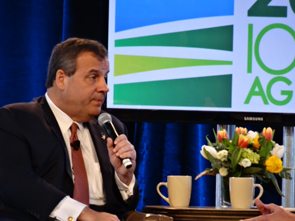 for a strong guestworker program to crop insurance and, of course, the Renewable Fuel Standard (RFS) – all of which he claimed to support. Woven in between his overall themes of limited federal government, less taxation and more market-oriented solutions were several jabs at President Obama over his lack of leadership and decision-making skills.
for a strong guestworker program to crop insurance and, of course, the Renewable Fuel Standard (RFS) – all of which he claimed to support. Woven in between his overall themes of limited federal government, less taxation and more market-oriented solutions were several jabs at President Obama over his lack of leadership and decision-making skills.
“Having someone in charge that’s run something before would be helpful,” he emphasized as the heavy Republican-leaning crowd laughed.
He struck just the right tone with farmers on environmental issues, promoting voluntary solutions at the state level and asking: “Who wants to protect the environment more than farmers who rely on it for their success?”
Confronted by two hecklers who stood up in the middle of the audience of about 900, he played “Iowa nice” instead of angrily erupting as he’s done in some previous encounters. As security removed the duo -- who said they had come from New Jersey to protest the aftermath of the 2012 weather disaster in that state – Christie said: “Glad to see that N.J. has come to Iowa ... I think you understand that I’ll deal with you the same way here as I do in New Jersey.” Then he added....”My people follow me everywhere, Bruce. I’m magnetic.”
Mike Huckabee: The 2008 Iowa Caucuses winner and former Fox News talk show host appeared relaxed while serving up some feisty populist rhetoric that played well with the crowd – even though some of his lines probably would incite disputes with international trading partners whom Iowa farmers and agribusinesses increasingly rely on for their profits.
“America need to do three things to be free: Needs to be able to feed itself, fuel itself and fight for itself,” he emphasized. “The food on the table, the fuel in our tanks and the weapons of our self-defense -- the degree of which we’ve outsourced any of those three is the degree in which we’ve outsourced our freedom.”
He expressed doubts about the Trans-Pacific Partnership. “If it’s not fair trade, it’s not free trade,” Huckabee told the crowd and he took a hard line on the Chinese, noting that trade deals have not helped working-class Americans but promoted “globalists and corporatists.”
“I don't care if it helps the Chinese. I don't really care if it makes the European Union stronger," the former Arkansas governor said about trade deals. "I care if it makes America stronger as a nation and American families able to reach the next rung in the economic ladder. And a lot of our decisions today that we're making are not doing that."
He made it clear that he still supports the RFS and called for combining 17 different federal programs dealing with food into one.
Jeb Bush: As a former Florida governor from 1999-2007 and the son and brother of two former presidents, Jeb Bush carries plenty of name recognition in Iowa, as well as some of the baggage that goes along with his pedigree. But when he took the stage at the Iowa Ag Summit, dressed in a blue blazer and open shirt, he demonstrated that he was his own man and connected well with the audience, whose numbers swelled as he started to speak. Bush was able to thread the needle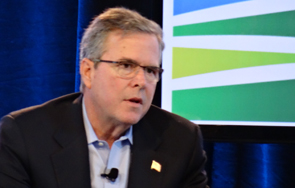 when asked about the RFS– emphasizing a bright, long-term future for renewable energy and calling on the EPA to act on finalizing long-delayed annual targets, which were first signed into law under his brother in 2007 -- while allowing it to phase out in 2022 as called for in current law. Yet, he wrapped the RFS within a market-oriented theme that’s red meat for many of the ultra-conservative groups he’s courting.
when asked about the RFS– emphasizing a bright, long-term future for renewable energy and calling on the EPA to act on finalizing long-delayed annual targets, which were first signed into law under his brother in 2007 -- while allowing it to phase out in 2022 as called for in current law. Yet, he wrapped the RFS within a market-oriented theme that’s red meat for many of the ultra-conservative groups he’s courting.
“Creating a certain playing field has to be part of the answer," Bush said, adding that “whether it's ethanol or any other alternative fuel, whether it's renewable or otherwise, the markets are ultimately going to have to decide this.”
Responding to a question about food labeling, he talked about shopping in a local grocery store and drew applause when he talked about buying Iowa beef and mixing up some “really good guacamole,” pronouncing the “guacamole” with an accent indicative of his ability to speak fluent Spanish. It was a not so subtle reminder that he may be the GOP’s best shot to court Latino voters who will be crucial to winning the White House. He came across as presidential, but also as someone whom you might find shopping in a local supermarket – unlike his father. In 1992, U.S. President George H W Bush debated Bill Clinton and Ross Perot and was forced to admit he did not have any idea how much a gallon of milk cost.
But while he scored a hit with Iowa beef producers, he clearly was not well-versed in the political nuances surrounding mandatory Country-of-Origin-Labeling (COOL). “I want to know where that avocado is from. I want to know where those onions are from ... and all the secret stuff I put in it,” he explained referring to his guacamole. Mandatory COOL has long been favored by the more Democratic-leaning National Farmers Union and opposed by the GOP- leaning National Cattlemen’s Beef Association.
Ted Cruz: An eloquent orator and firebrand conservative, Texas Sen. Ted Cruz did his best to come across as a principled truth teller who won’t cave in to the “ways” of Washington. But those who have watched him block progress on legislation and try to shut down the government were not convinced that he looked presidential.
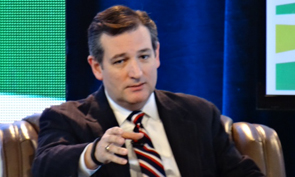 He said he supported biofuels, but carefully framed his lack of support for the RFS as consistent with his overall opposition to government intervention in the markets and subsidies for corporate welfare. And in a roomful of mostly RFS supporters, he got some applause for delivering this:
He said he supported biofuels, but carefully framed his lack of support for the RFS as consistent with his overall opposition to government intervention in the markets and subsidies for corporate welfare. And in a roomful of mostly RFS supporters, he got some applause for delivering this:
“The answer you’d like me to give is I’m for the RFS, darn it, and that would be the easy thing to do. But people are pretty fed up with politicians who tell one group one thing, another group another thing and then they go to Washington and do nothing. They aren’t doing what they said they would do.”
He too, had done his homework on the issues, citing plan scientist Norman Borlaug for saving over a billion lives through the Green Revolution. He criticized the EPA’s proposal to define the “Waters of the U.S.” as “completely lawless” and gave a nod of support to the Farm Bureau’s “Ditch the Rule” campaign. Most of his answers were lengthy.
Lindsey Graham: Commanding, charming and extremely comfortable on stage, Lindsey Graham, projected the broadest grasp of agricultural and rural issues amongst all of the candidates. We didn’t find anyone who thought he could win the GOP nod, but he sure was a crowd pleaser.
A frequent guest on the Sunday news shows, and a former member of the Senate Ag Committee from 2007-2009, the senator from South Carolina has finely honed his communication skills and displayed knowledge of everything from GMOs to rural electric co-ops and, of course, ethanol.
honed his communication skills and displayed knowledge of everything from GMOs to rural electric co-ops and, of course, ethanol.
“Every gallon of ethanol you can produce here in Iowa is one less gallon you have to buy from people who hate your guts,” he noted as he expressed support for the RFS as part of an “all of the above” energy strategy. “Wind, solar, coal ... if we got it, let’s use it. If we can get off of dependency on foreign oil, let's do it."
Graham fits the bill for anyone looking for a pragmatic GOP politician who’s willing to work across the aisle when needed. On the question of immigration, he pointed out the painful political realities that no other speaker dared confront and drew sharp contrasts with his Senate colleague Ted Cruz.
“I promise you one thing. There will never be an immigration reform bill where you get everything you want and the other side doesn’t get anything. That’s called life. I want to get this thing fixed and behind us. It’s hurting the party,” he continued. “And the only way I’m going to do that is to deal with Democrats....” But then he closed on a lighter note and the room erupted in laughter again. “I’ve enjoyed my time in Iowa, but how the hell did you vote for Obama twice? Don’t do that again.”
Rick Perry: The former Texas Governor has the best farm “creds” of any GOP contender .... born and raised on a Texas farm without running water, participated in 4-H, showed club calves, attended Texas A&M, and served as state representative and state agriculture commissioner before being elected as governor. He wove pieces of his farm background throughout his appearance, along with references to Iowa Gov. Terry Branstad. But he struggled to offer crisp, concise answers, suggesting that previous runs for the White House have not yet made him ready for prime time on the national level.
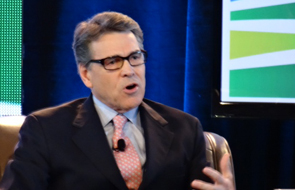 Rather than a “yes” or “no” answer on his support for the RFS, Perry weaved and bobbed – admitting that he had asked for a waiver from the mandate as Texas governor in 2010-11. He said it was the right decision for his state during the drought, but then seemingly said he would accept the federal mandate until a time when all energy subsidies could be scrutinized to see if they are “in the best interests of our country.
Rather than a “yes” or “no” answer on his support for the RFS, Perry weaved and bobbed – admitting that he had asked for a waiver from the mandate as Texas governor in 2010-11. He said it was the right decision for his state during the drought, but then seemingly said he would accept the federal mandate until a time when all energy subsidies could be scrutinized to see if they are “in the best interests of our country.
“I don’t think you pull the RFS out and discriminate against the RFS and leave all of these other subsidies and mandates in place,” he told the crowd before switching to a states’ rights argument. “I don’t think Washington, D.C. – whether it’s on deciding on what our child’s curriculums should be, deciding what our health care should be .... or picking winners or losers when it comes to agricultural products.” If a state wants to set an energy mandate, like Texas has done for wind, he said that’s okay.
Perry’s crispest lines of the day came when he tried to explain why trade with China was good, but Cuba was bad. “What we see with China is they basically practice communism at night and capitalism during the daytime.” On Cuba, the deal Obama cut was bad because “the administration basically empowered the Castro regime with no thought about helping the people.”
George Pataki: The three-term governor of New York from 1995-2006 worked hard to introduce himself to Iowans, sharing his agricultural background and extensive knowledge of a wide range of ag-related issues. He is opposed to the RFS, saying “I don’t think the government should force you to buy anything.”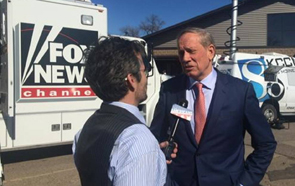
Pataki expressed support for immigration reform, provided “our borders are secured first.” But he also embraces an idea that won’t likely go far with many Iowans – allowing immigrants to obtain legal status by serving 200 hours of community service.
He offered strong support for biotech in agriculture, suggesting that we should not allow a state to “frighten people” with GMO labeling... at least not any more than “we should warn people that organic has been spread with manure and you should wash it more carefully.”
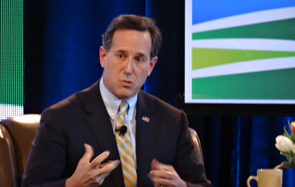 Rick Santorum: The winner of the 2012 Iowa Caucus has a compelling family story that usually tugs on the heartstrings of conservative voters, but when asked about ag and rural issues, he appeared a bit flat on Saturday. The former Pennsylvania senator (1995-2007) previously served as a member of the Senate Agriculture Committee and he made clear he would be a champion for farmers and rural causes. He said lawmakers need keep small towns in mind to create programs that benefit "all of America, not just the population centers."
Rick Santorum: The winner of the 2012 Iowa Caucus has a compelling family story that usually tugs on the heartstrings of conservative voters, but when asked about ag and rural issues, he appeared a bit flat on Saturday. The former Pennsylvania senator (1995-2007) previously served as a member of the Senate Agriculture Committee and he made clear he would be a champion for farmers and rural causes. He said lawmakers need keep small towns in mind to create programs that benefit "all of America, not just the population centers."
“Think of all the subsidies and mandates and things we do for the major cities of this country,” he said.
Dressed in a business suit and cowboy boots, Santorum easily navigated between topics. He was not asked about an issue that concerns some agriculturists - his cooperation with the Humane Society of the U.S. – his support in 2001 of an animal welfare bill for dogs that would have required commercial breeders to provide “socialization” for the animals at breeding facilities.
Scott Walker: The crowd had thinned by the time the Wisconsin governor arrived as the last speaker of the day, but he received repeated applause when he talked about his positions on moving needy Wisconsin citizens from welfare to work – requiring job training for able-bodied adults in exchange for assistance. Focused and crisp with his responses, he worked hard to demonstrate his Iowa ties and mentioned Iowa Gov. Terry Branstad more than any other candidate.
On the RFS, he seems to be “evolving” on in order to play well in the Hawkeye State – Walker offered to drop his previous opposition and embrace the federal mandate until there is a “free and open marketplace.”
In general, he said “I’m someone who believes in a free and open market,” said Walker "It's an access issue, and so it's something I'm willing to go forward on continuing the Renewable Fuel Standard and pressing the EPA to make sure there's certainty in terms of the blend levels set," Walker said. Long term, he said his "goal would be to get to a point where we directly address those market access issues and I think that's a part of the challenge. So that eventually you didn't need to have a standard."
Whether his “evolution” on issues helps him gain traction or hurts him remains to be seen. sure there's certainty in terms of the blend levels set," Walker said. Long term, he said his “goal would be to get to a point where we directly address those market access issues and I think that's a part of the challenge. So that eventually you didn't need to have a standard."
Asked if candidates who want to win the Iowa caucuses have to support the RFS, Iowa Sen. Chuck Grassley said, “I think it will help them if they do, but I don’t think they have to. And if they were seen as compromising some previous positions they’ve taken just because they are running for president, it would do more harm than good.”
#30
For more news, go to www.Agri-Pulse.com